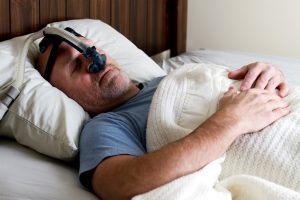Tired of CPAP Masks? Here are some CPAP Alternatives
 If you have sleep apnea, chances are that your doctor has asked you to use a continuous positive airway pressure (CPAP) machine. This machine utilizes a hose and a mask to push air into the back of your throat in order to help keep your airway open during sleep. CPAP can help reduce the number of times that you stop breathing during the night.
If you have sleep apnea, chances are that your doctor has asked you to use a continuous positive airway pressure (CPAP) machine. This machine utilizes a hose and a mask to push air into the back of your throat in order to help keep your airway open during sleep. CPAP can help reduce the number of times that you stop breathing during the night.
When used properly and consistently, CPAP can be very effective. The machine improves sleep patterns and oxygen levels and can reduce or eliminate other effects of sleep apnea, including daytime sleepiness, fatigue, and irritability.
Although many patients start using CPAP, some abandon the machines or don’t use them every night due to the fact that it can be uncomfortable.
In this blog, our doctors of Sleep & Neuroscience Associates explains more about CPAP alternatives.
What problems can patients have with CPAP?
Some patients find CPAP to be uncomfortable and may have difficulty tolerating the air pressure, mask, and headgear. Some say they can’t sleep well because they cannot move freely with the hose and mask, and others feel claustrophobic when wearing the mask.
If patients fail to use their CPAP and don’t ask their doctor for help finding an effective alternative, they could be putting their overall health at risk.
What are some CPAP alternatives?
CPAP remains an excellent form of treatment for patients who can tolerate it well and are committed to using it nightly. However, if you’re tired of CPAP masks, don’t abandon them without finding another way to help your nighttime breathing and overall health. Particularly if you have mild sleep apnea or upper airway resistance syndrome (UARS), there may be other ways to effectively treat your condition, depending on your particular needs.
The following are some effective CPAP alternatives:
- Lifestyle modifications – Measures such as losing excess weight, quitting smoking, exercising regularly, and avoiding alcohol and sedatives can help with sleep apnea.
- CPAP Desensitization – This can help make CPAP easier to use by identifying the reasons why patients aren’t using it.
- Changing sleeping positions – Sleeping on your side helps keep your airway open, so back sleeping is discouraged for people who snore and have sleep apnea. If you’ve having trouble adjusting to sleeping on your side, special pillows and devices can help, or you may even try the “tennis ball in a sock technique”
- Medication – Medications can be used to help treat mild sleep apnea in some cases.
- Oral appliance therapy – Custom-made mouthpieces can help gently move the jaw forward and keep the tongue from blocking your airway at night.
- Inspire therapy – This small, pacemaker-like device is surgically implanted on the chest wall. It helps stimulate a nerve that controls the tongue muscles in order to keep the airway open during sleep.
- Apnicure Winx therapy system – A small mouthpiece helps in creating a suction and keeps the airway from closing during sleep.
Where should you get CPAP alternatives for your sleep apnea?
Our doctors of Sleep & Neuroscience Associates in Greenwich, CT specializes in the diagnosis and treatment of sleep disorders, including sleep apnea.
Our doctors are dedicated to delivering the highest level of expert care for patients who are experiencing sleep disorders. The comfort and convenience of patients is a top priority, and he offers telesleep services so current patients can easily connect with him via a computer or handheld device from the comfort of their home.
If you have sleep apnea and would like to find out more about CPAP alternatives, contact Sleep & Neuroscience Associates today.







